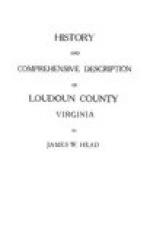SECESSION AND CIVIL WAR.
Loudoun County in the Secession Movement.
The election of Lincoln and attendant success of the Republican party revived the determination of the South to secede from the Union.
Just at this juncture the prosperity of Loudoun was unprecedented, and the threatened dissolution was a serious menace to her progress. General trade had recently been greatly stimulated, and the resources of the County were being daily multiplied.
Following the resolute lead of the other southern States, the legislature of Virginia, on January 14, 1861, authorized a State convention to consider the advisability of secession, and the members elected in pursuance thereof met in the capitol, at Richmond, at 12 o’clock a.m., on Wednesday, the 13th day of the February following. They constituted what was perhaps the ablest body of men that ever assembled in the State, and the friends and foes of secession were alike represented. The delegates from Loudoun were John Janney and John A. Carter, both of whom had represented her in the constitutional convention of 1850,51.
Roll call was followed by the election of a permanent chairman, Mr. Janney, of Loudoun, receiving a majority of the whole number of votes cast. Two of the members were then designated a committee to wait upon the president of the convention to inform him of his election and conduct him to his seat. Whereupon he addressed the convention as follows:[29]
[Footnote 29: The unabridged publication in this work of Mr. Janney’s speech of acceptance has seemed specially appropriate. It is the plea of a Loudoun man for conservative action boldly put forth at a time when men’s passions were inflamed almost beyond human credulity, and while he himself was the presiding officer of a body which had met to decide the destiny of the Old Dominion and whose deliberations were to be watched with breathless interest by the people of both hemispheres.]
“Gentlemen of the Convention: I tender you my sincere and cordial thanks for the honor you have bestowed upon me by calling me to preside over the deliberations of the most important convention that has assembled in this State since the year 1776.
“I am without experience in the performance of the duties to which you have assigned me, with but little knowledge of parliamentary law and the rules which are to govern our proceedings, and I have nothing to promise you but fidelity and impartiality. Errors I know I shall commit, but these will be excused by your kindness, and promptly corrected by your wisdom.
“Gentlemen, it is now almost seventy-three years since a convention of the people of Virginia was assembled in this hall to ratify the Constitution of the United States, one of the chief objects of which was to consolidate, not the Government, but the Union of the States.




